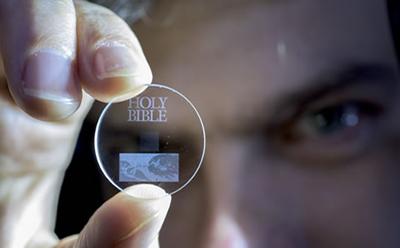Eternal 5D nanostructured glass optical discs hold 360TB of data and last billions of years

Storing data is extremely important for many situations. Businesses often need to retain information for legal purposes, while home users cherish things like family photos and heirloom recipes. For many people, utilizing flash drives, optical media, or the cloud is sufficient. I prefer redundancy -- cloud and local data.
What if you need to store a lot of data? I'm talking, like, a lot of friggin' data. Well, your needs may be met by a new invention from the University of Southampton. Not only can its newly announced Eternal 5D nanostructured glass discs hold 360TB of data, but they can last billions of years too. Hell, these discs could possibly outlive the Earth and its sun!
"The storage allows unprecedented properties including 360 TB/disc data capacity, thermal stability up to 1,000°C and virtually unlimited lifetime at room temperature (13.8 billion years at 190°C ) opening a new era of eternal data archiving. As a very stable and safe form of portable memory, the technology could be highly useful for organisations with big archives, such as national archives, museums and libraries, to preserve their information and records", explains The University of Southampton.
The university further explains, "coined as the 'Superman memory crystal', as the glass memory has been compared to the 'memory crystals' used in the Superman films, the data is recorded via self-assembled nanostructures created in fused quartz. The information encoding is realized in five dimensions: the size and orientation in addition to the three dimensional position of these nanostructures".

Will you be using Eternal 5D nanostructured glass discs to store your mp3s and family photos anytime soon? Heck no! Not only is this technology nowhere near being ready for consumers, but it may never even be adopted. Still, the technology behind the invention is impressive, and further shows that humans have not hit a wall with innovating new technology.
The real potential here is not in the capacity, but in its durability. For those wanting to record information for posterity -- such as works of art, historical texts, literature and history, Eternal 5D could be absolute perfection.
What do you think of this technological breakthrough? Tell me in the comments.
